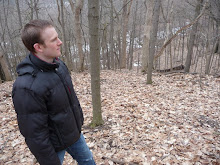


Several days into my new life in Wheaton, I'm quite pleased with my new house and housemates, I'm excited about my new church, and I can't wait to get started on my job on Sunday. Yet, I'm also finding that adjusting to life here in Wheaton is taking at least as much, if not more effort than adjusting to any of the places I visited in Japan. Maybe it's because I expected to be a foreigner there. Or maybe because I knew I was leaving again soon. Regardless, the prospect of entering into a new place, forming new relationships, even adapting to a new culture, is somewhat daunting.
Below is a poem I wrote along these lines. The form is a modified quatrina--the four lines of each stanza end in the same four words, like themes, though their place is shifted each time. I found the constant movement and the discordant familiarity of the repetition reminiscent of the feelings of moving to a new place.
"So this is home now"
So this is home now:
re-paint what were another's walls,
enclose in them my things and then call "home"
where moments ago was only "here."
My posters there, my favorite mug goes here,
old textbooks stacked (they seem less urgent now).
My life a mosaic of former homes
like the farrago of photos hanging on the walls.
Outside hang other lives on other walls
who lay a longer, stronger claim to here.
Our paths, though separate, intersect us now,
though for the traveler, any "here" is home.
Yet I, though foreign, may be most at home,
who still must learn this city's unseen walls.
Another language, culture to learn now,
in homelessness I make my home here.
For where is home but where God puts me now
and the jasper walls I'll find when I leave here?




